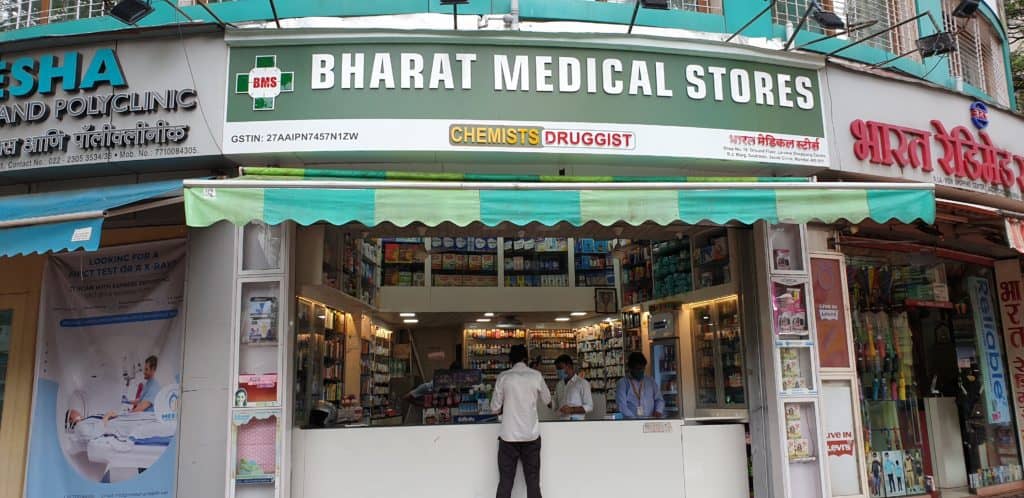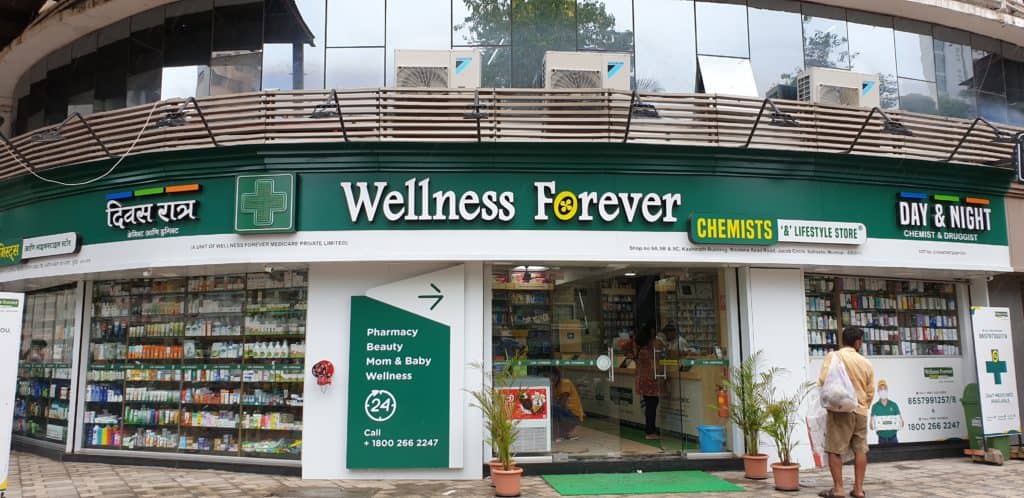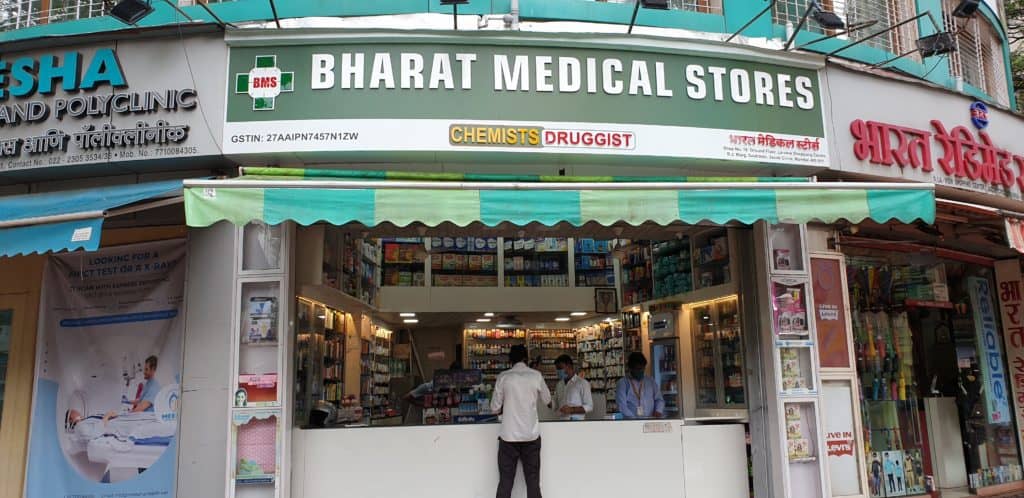As one enters Day 2 Day Medical in Mazgaon, Byculla the huge pharmacy counter right at the back of the large store catches the eye. Three long aisles of all kinds of products — packaged food, toiletries, cosmetics, and items of daily need — separate the entrance from the counter, which has a large front that runs up to the ceiling. Upon this front are written the words, “He Cures, We Serve”.
Day 2 Day Medical is one of several new format stores that have been proliferating in Mumbai all through the pandemic-induced lockdowns. “We actually have two branches of this store, and both were opened during the pandemic,” Vijay Khale, purchase and operations manager at Day 2 Day, tells me. The branch in Byculla opened last year in September, while the other branch opened in January 2021.
The store stocks all kinds of FMCG (fast-moving consumer goods) products, has a security guard who opens the door, has shopping baskets, and unequivocally creates a supermart-like feel.

One of the most interesting additions to Mumbai’s cityscape since the pandemic erupted is the mushrooming of 24/7 pharmacy-cum-convenience stores seemingly at every other street corner. These are huge establishments with loud facades and glaring lights, flashily advertising the discounted sale of sundry items of everyday need.
A few of these stores were present since before the first nationwide lockdown was announced in March 2020.
Cashing on an emerging trend
Crucially, pharmacies did well during the lockdown overall.
With few other shops being allowed to remain open, pharmacies emerged as new centres to buy FMCG products. And they were also generally allowed to stay open longer.
The increase in pharmacy-cum-convenience stores over the course of the pandemic may point towards a financial opportunism on the part of businesses, both established and emergent. Abhik Banerji, a research associate at National Institute of Urban Affairs who is originally from Mumbai, agrees, saying that this “might simply be a play to capture demand for a product that is currently surging.” He points to subsidised rentals or rent reliefs for temporary periods during the pandemic as another likely contributory factor towards the rise of such outlets. “However, once rental/leasing prices start to recover, one can expect a drop in growth of these multipurpose convenience stores,” he says.
People generally preferred to physically visit local kirana stores to buy items of everyday need, even during lockdown, rather than have things delivered to them through apps and websites that often failed them at crucial moments.
Read more: Mumbai’s metro lines: opportunity for locating jobs?
The need to see before buying
Despite stay-at-home mandates and the fact that online pharmacies are also booming, such newly constructed brick-and-mortar stores are built in a way that is calculated to provide a “shopping” experience for the customer.
Moreover, as studies on supermarkets corroborate, looking at items displayed a certain way coupled with shrewd discounting strategies and “bargain” sales make you spend more.
Uwais Kapadia, owner of Just Care Medical on Grant Road says that people have entered this business because they saw that there was profit to be had. The Grant Road outlet is a new branch of their original store, also in Mazgaon, which he is quick to point out opened in 2017 and not during the pandemic.

Like Day 2 Day Medical, Just Care Medical too is going for a certain aesthetic, where the layout emphasises the store’s spaciousness, with aisles stocking all kinds of essential products on one side and a clearly demarcated area for the pharmacy counter. “People like to look at what they want and then buy,” says Kapadia.
Khadija Mookhtiar, a frequent shopper at Day 2 Day, agrees. Even when there is no cap at home deliveries, which are free to begin with, she prefers visiting the store to get the things she needs. “Plus there is a lot of variety offered, so it’s better to shop that way.”
“Anyone would wish that their essential shopping needs were taken care of at one go,” says Vikas Sargar, manager and pharmacist at Bharat Medical Stores, a chemist shop. There are around four large establishments at about a kilometre of distance from Bharat Medical, including a snazzy new branch of Wellness Forever (that markets itself as a chemists and ‘lifestyle’ store) that lies on the corner of the next street, almost facing it. Sargar says that they too would have liked to expand the shop in the same way, except that space was an issue. One might assume rentals would be too.
Much like kirana stores, small chemist and druggist shops are banking on their regular customers, even as the services they promise — free delivery, easy and hassle-free return policy — are not different from those promised by their big-brand, grandiose competitors. The nearest pharmacy and convenience store, Mamaji’s Medical in Vile Parle, is a 15-minute walk away from home for Ashwini Pai, and she doesn’t mind going out of her way to shop there. “It’s open all through the night, and I like that there is time to move around, check new things, and pick out what you want from a variety of items rather than ask for something specific at the counter.” But when she has to buy medicines, she gets it from the corner shop that her family has always patronised.

Dealing with competition
When asked what sets these stores apart from only pharmacies or only kirana stores, Wahadat Naseem, pharmacist at the new branch of Wellness Forever emphasises upon ambience and the quality of service offered. “Shopping at a place like this will give you that brand-wali feeling, which is what customers want,” he says.
Standalone retail pharmacies themselves have a lot of competition their way, what with online pharmacies witnessing a surge in sales, especially during the second wave. Despite that, there is a need felt for an ecosystem where the pharmacies source wellness products, fresh fruits and vegetable produce, organic products, herbal items, and still more.
Interestingly, most of the 24-hour establishments I spoke to said that the convenience store part of their model was doing better than the pharmacy side. Ashali Bhandari, senior urban planner at Tandem Research says that it is also “worth exploring if these new pharmacies are opening in upper class, middle class or lower class neighbourhoods evenly.” But the rapidity with which these stores are being constructed (I counted two new ones along the stretch of one road that already had established pharmacies/convenience stores) makes one wonder about competition between these stores themselves. When asked how they planned to handle competition, the focus was again drawn to providing good service, and creating a nice ambience for the customers to shop in. “There is nothing more innovative that we can do, other than this,” Kapadia said.
If these establishments are indeed riding on a trend, it would be curious to see what happens to them once the pandemic is over.
Also read:
Well worded. The writer seems to have personally seen these places and spoken to a number of people. Her opinion is based on what she has seen rather than heresy.